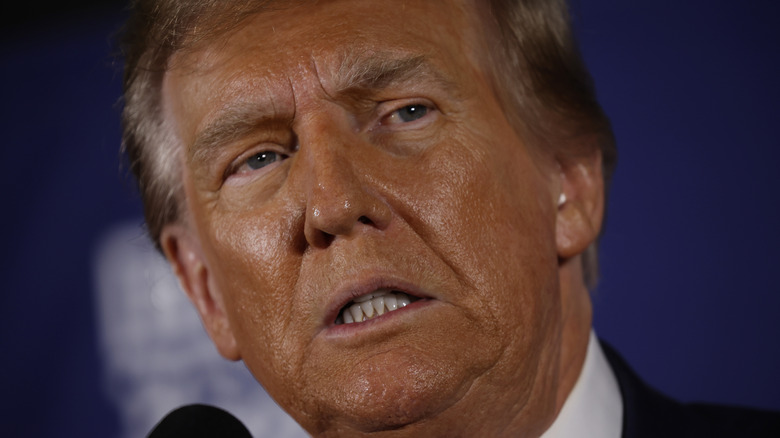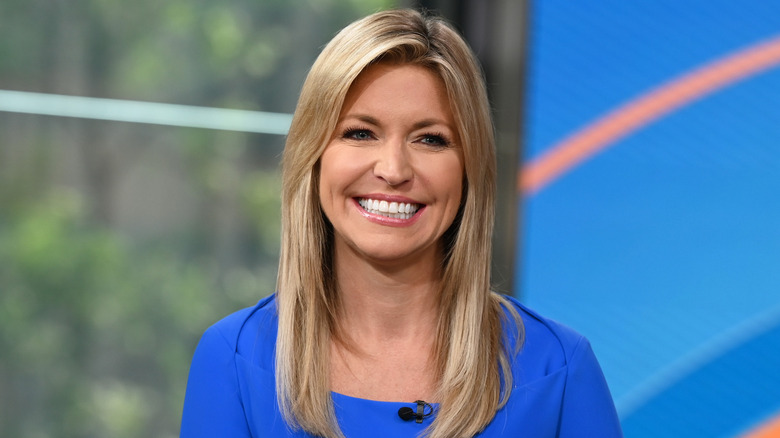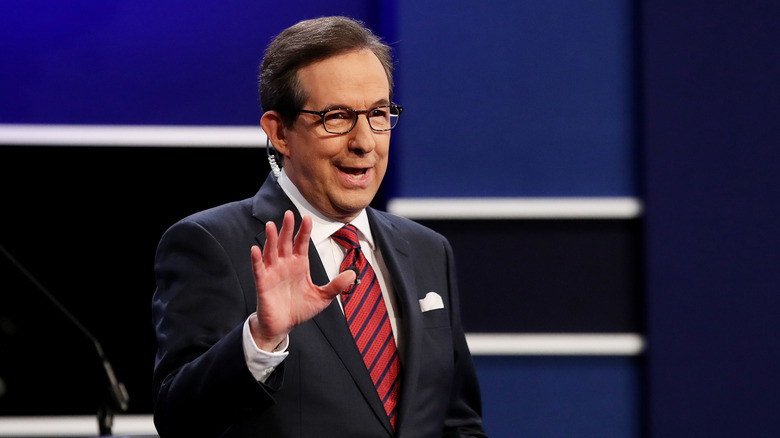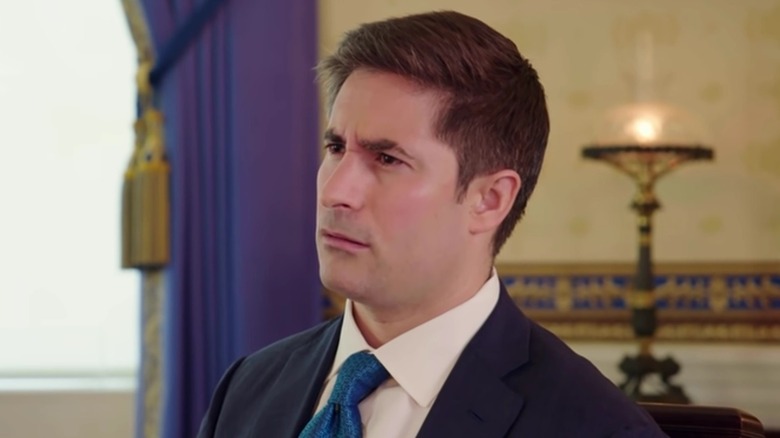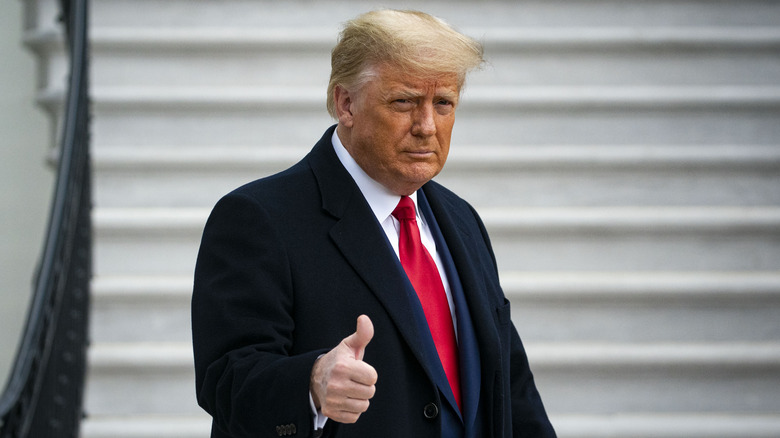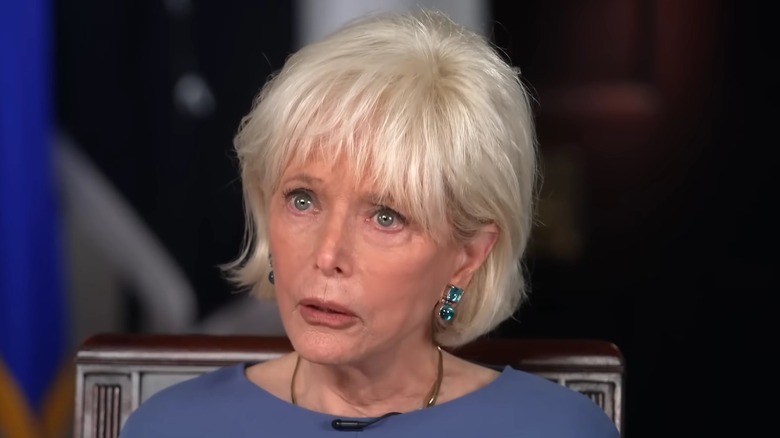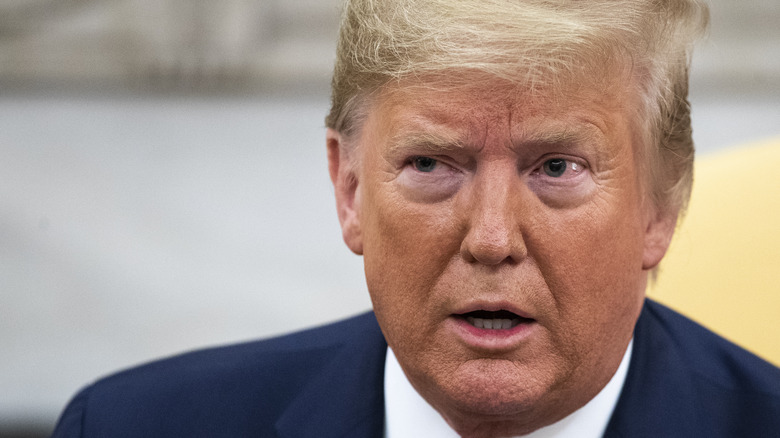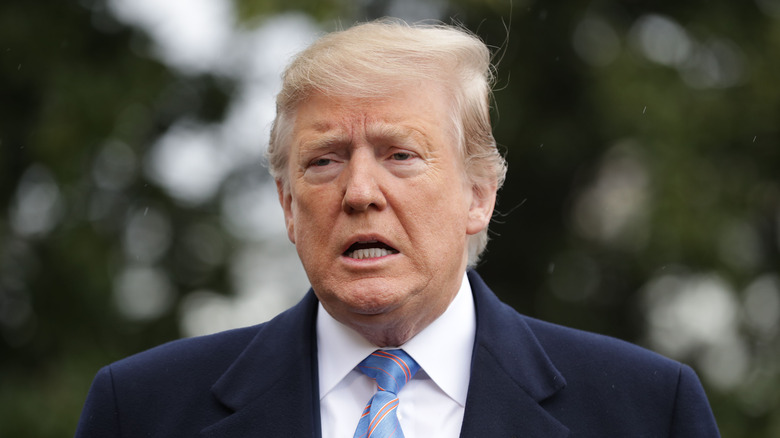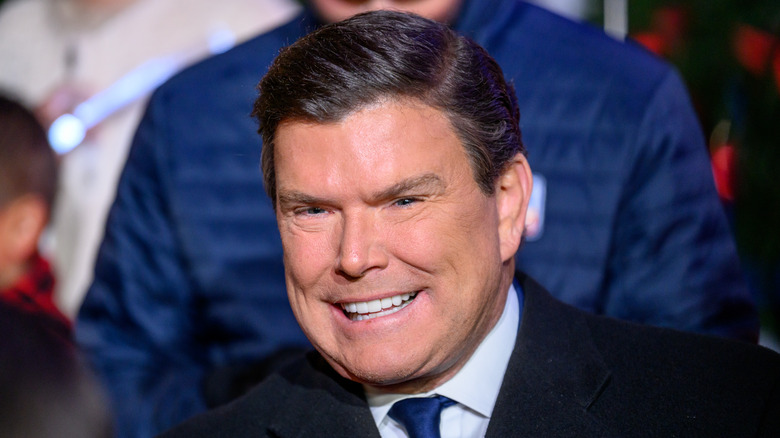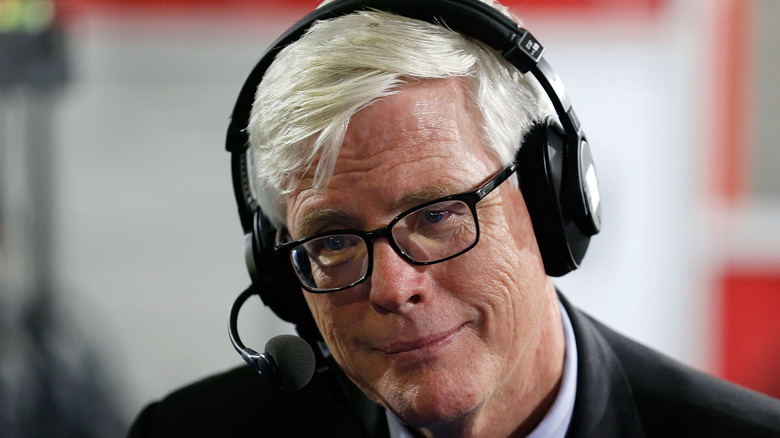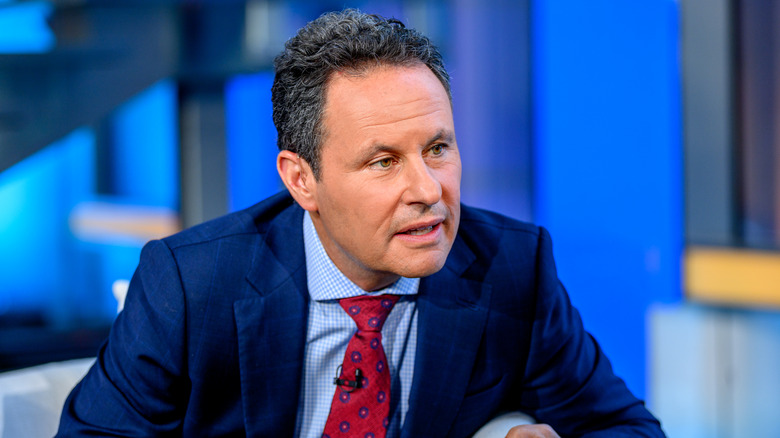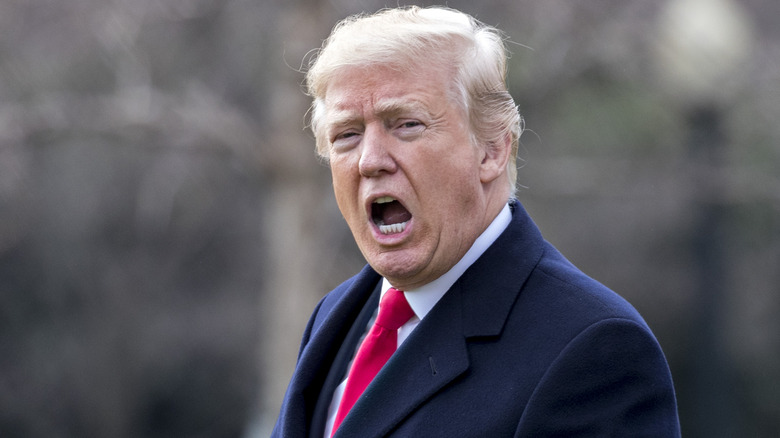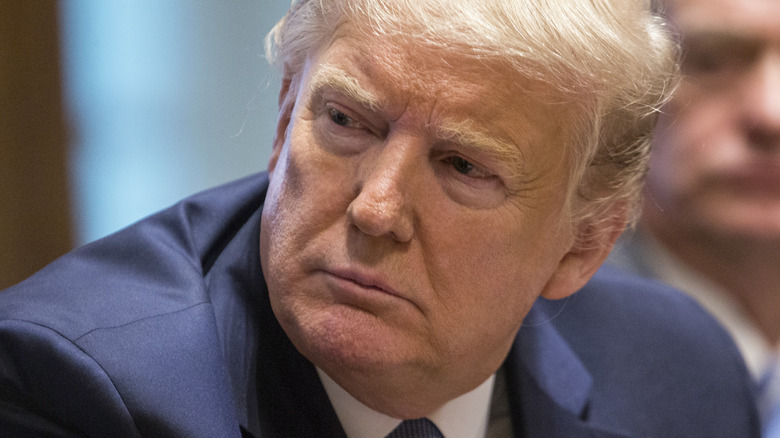The Most Disastrous Donald Trump Interviews In History
U.S. presidents have faced off with some formidable adversaries over the country's history, but in the last decade or so, they have faced none more formidable than the English language. After eight years under President Barack Obama, one of the most eloquent men to ever hold the office, the contrast was glaring when he was followed by Donald Trump and then Joe Biden, two guys who have been known to wrestle with their words, to put it politely. To put it more accurately, they have been known to get treated by their words much like the Hulk treated Loki at the end of "The Avengers."
The similarity between the two ends, though, with that superficial observation. While Joe Biden has humorously referred to himself as a "gaffe machine," Donald Trump has insisted that he is a "very stable genius" while consistently and flagrantly serving up word salads topped off with arrogance dressing and croutons of falsehood. In interviews, Trump seemingly can't help but make whatever controversy he happens to be embroiled in at the time seem far worse, even in the friendliest environments — and while this tendency might not matter much to his dedicated supporters, it has kept the jaws of everyone else on the floor since the moment he declared his candidacy for the presidency in 2015. Here is the worst of the worst — the most disastrous interviews Trump has ever taken part in.
Fox and Friends, August 22, 2018
In August 2018, Donald Trump was having a not-so-good week during the rough mid-point of his presidency. On the 21st of that month, two close associates had found themselves on the wrong end of the legal system due to actions taken on Trump's behalf: former campaign aide Paul Manafort was found guilty of seven total counts of bank and tax fraud, and attorney and alleged "fixer" Michael Cohen had pleaded guilty to campaign finance violations connected to the infamous "hush money" payments to adult film star Stormy Daniels. Trump sought refuge in the safe confines of "Fox & Friends" to attempt to explain why none of this should reflect poorly on him — but despite the interview being conducted by the decidedly Trump-friendly Ainsley Earnhardt, it did not go well.
Trump opened by insisting that the whole being-president thing was going great and immediately downplaying his well-established, long-term connection to Cohen before offering up truckloads of fodder to his detractors. "Campaign violations are considered not a big deal, frankly," he said (via Factbase), woefully inaccurately; he complained that what Cohen did — accepting a lighter sentence in return for information on Trump's knowledge of the payments — is "called 'flipping' and it almost ought to be illegal," ignoring the fact that this is how law enforcement has put away drug kingpins and mob bosses for, like, ever. His borderline-confession to campaign finance violations was only the centerpiece of a rambling interview that observers such as The Washington Post called, "proof that Trump is either too clueless or too reckless to understand the implications of his own words."
Fox News Sunday, July 19, 2020
In July 2020, as the COVID-19 pandemic was battering America with hundreds of deaths per day with no end in sight, Donald Trump appeared on "Fox News Sunday" for a conversation with Chris Wallace, who is known to be no softball interviewer. After suggesting — incredibly — that the COVID numbers wouldn't be so high if we just didn't test as much (via Rev), Trump produced cherry-picked data (picked apart in voiceover by Wallace) to erroneously state that the U.S. had the lowest mortality rate from the disease in the world. He pushed back on Wallace's assertion, backed by data, that new cases were hovering around 75,000 per day, before appearing to acknowledge those numbers by uttering perhaps the five most callous words of his presidency: "It is what it is."
Later in the interview, he stated flatly that Joe Biden was planning to "defund the police" if elected (which was not true, again pointed out by Wallace in voiceover), downplayed the recent, horrific spate of killings of unarmed Black people by police, and offered a chilling glimpse into the future by refusing to say whether he would accept a peaceful transfer of power if he were to lose the 2020 election. Trump also bragged about how he "aced" a recent cognitive test — a test that Wallace had also taken after he heard Trump had passed it. "It's not the hardest test," Wallace deadpanned. "[There's] a picture and it says, 'What's that?' And it's an elephant."
Axios on HBO, July 28, 2020
Just nine days after the "Fox News Sunday" catastrophe with Chris Wallace, Donald Trump found himself in the company of an even more unfriendly interviewer: Jonathan Swan of Axios, who interviewed the president for HBO. Perhaps smelling blood in the water, Swan immediately went after Trump on his handling of the COVID-19 pandemic, forcing Trump to double down on his false claim that reported cases were only rising because of increased testing, and even getting him to repeat, with respect to 1,000 Americans dying per day at that time, "It is what it is" (via Rev). Swan, though, was far from done.
The interviewer, fighting against constant cross-talk from Trump, maneuvered the president into falsehoods or non-answers on a litany of hot subjects: Trump's failure to take Russian president Vladimir Putin to task on reports from American intelligence that Russia had placed bounties on U.S. soldiers (Swan: "It's because you don't believe the intelligence. That's why,"); Trump's talking point that mail-in voting was a new, easily manipulated thing ("Swan: "You've had mail-in voting since the Civil War,") and Trump's sympathetic remarks about Jeffrey Epstein's girlfriend Ghislaine Maxwell (Swan: "I mean, she's an alleged child sex trafficker,") among others. Swan doggedly pushed back against Trump's falsehoods and dodges at every turn, and after back-to-back interview debacles, observers in the media were stunned. "[The Axios interview] was an offense against reason, against wisdom, and it rendered every compliment ever directed at the American experiment into a sad, bedraggled parody," opined Esquire. "How did we all come to this?"
Fox News, July 22, 2020
For all of the stones that Donald Trump likes to throw at Joe Biden over the question of the latter's mental acuity, it often seems as though he doesn't realize or care that his own mangling of the English language and demonstrable lack of knowledge on certain topics constitutes a pretty fragile glass house. Case in point: Trump's July 22, 2020, interview with Fox News, during which he somehow managed to turn a softball question about Biden's mental fitness into a glaring question mark regarding his own.
Interviewer Marc Siegel related that he had seen a lot of recent speculation about Trump's mental health, then teed up the not-so-obvious question with respect to said speculation: "What do you think should come out ... regarding Vice President Biden?" (via Factbase). Ignoring the easy layup, Trump regaled Siegel with a story about how he had requested a cognitive test from his doctor, describing the final series of questions as being very difficult. "You will go person, woman, man, camera, TV. So, they say, could you repeat that? So, I said, yes. So, it's person, woman, man, camera, TV. Okay, that's very good. If you get it in order, you get extra points." Siegel then sat in near silence as Trump, at length, praised himself for his sterling performance on this test. Needless to say, pundits were flummoxed; The New Yorker observed that Trump's mental acuity "is one of the hardest things for journalists to write about — or would be, except that he himself keeps bringing it up."
60 Minutes, October 20, 2020
There are contentious interviews, and then there is the one that Donald Trump sat for on the legendary news program "60 Minutes" in late 2020, conducted by correspondent Lesley Stahl. Just two weeks before the election that Trump would end up losing to Joe Biden, and with the COVID-19 pandemic raging on, Trump appeared to be in no mood for anything but a puff piece, which is not what he was going to get from Stahl. The interviewer opened by asking Trump if he was good with some tough questions, prompting a minute of hemming and hawing after which he finally answered, "No, I'm not ... you don't ask [Joe] Biden tough questions."
Trump continued in that vein for the remainder of the interview, dodging or otherwise giving non-answers to questions (which were indeed tough) on the pandemic, foreign policy, his tanking numbers with suburban voters, and the economy; finally, he once again complained that Biden never got this kind of treatment before terminating the interview, failing to return for a second portion which brought in Vice President Mike Pence. (Pence sat for this portion alone.) Not only was Trump's petulance a very bad look for a widely watched national TV program weeks before the election, but his White House took the unprecedented step of releasing the interview, in its entirety, before the broadcast even took place, in the interest of exposing that meanie Lesley Stahl's "FAKE and BIASED" style, as Trump wrote on X, formerly known as Twitter (via Politico) — violating an agreement with CBS News.
Time Magazine, June 17, 2019
In mid-2019, Donald Trump was sitting down with a quartet of Time magazine reporters for a fairly wide-ranging interview that, for a time, was going reasonably well. Trump handled some pretty routine questions about issues in the Middle East and the border situation, navigating the queries with just one huge, glaring falsehood. (He claimed that he "inherited" the policy of separating families at the border from his predecessor, Barack Obama, which was in no way true.) In the middle of a discussion about who he thought his Democratic challenger might be in 2020, Trump inexplicably decided to show the assembled journos what he said was a handwritten letter from North Korean dictator Kim Jong Un — and that's when things started to get weird.
One of the reporters attempted to take a photo of the letter, but was stopped by then-press secretary Sarah Sanders. The interview then continued as normal — but when it turned to questions about the investigation that was then being conducted by special counsel Robert Mueller, the reporter's previous transgression suddenly came back into play. "Well, you can go to prison instead," Trump said. "I didn't give [the letter] to you to take photographs of it." The reporter was understandably taken aback, and Trump launched into a round of complaining about Time's supposed shoddy treatment of him. Trump's threat made headlines, with The Washington Post pointing out that his former FBI director, James Comey, had once revealed that Trump had previously mused about the possibility of tossing unfriendly reporters in the clink for a few days.
NPR, January 11, 2022
Donald Trump's early 2022 phone interview with NPR's Steve Inskeep was painful to listen to — but at least it was mercifully brief, as Trump cut it short after only nine minutes. Inskeep opened with a few simple questions about whether Trump would encourage people to get the COVID-19 vaccine, causing Trump to immediately contradict himself ("I recommend taking them ... [but] I don't know why they would be getting the vaccine, for the most part"). The conversation then turned to the 2020 election — and Trump quickly blew his stack when pressed on his false, oft-debunked claim that it was stolen from him.
Inskeep ran down a litany of Republicans — including South Dakota Senator Mike Rounds, Arizona election auditor Doug Logan, Trump-appointed U.S. District Judge Brett Ludwig, and Trump's own attorneys — who have declared the 2020 election to be clean and free of significant voter fraud, prompting ever-more annoyed responses from Trump; Rounds was "wrong on that," Arizona election officials were "RINOs" (Trump's frequently-invoked shorthand for "Republicans in Name Only"), and Republican Senate leader Mitch McConnell was "a loser." When the line of questioning turned to the Capitol assault of January 6, 2021, that's when Trump peaced out, thanking Inskeep and hanging up the phone. In a follow-up piece, NPR speculated that while Trump had managed to dodge Inskeep's intended line of questioning, he or his lawyers may one day have to address those questions for a judge — a prediction that, of course, has since come true.
Fox News, June 19, 2023
Of the many legal issues that Donald Trump has been presented with in the aftermath of his presidency, one of the more serious would have to be his retention of classified documents, some of them sensitive in the extreme, which were discovered by the FBI during a raid on Trump's Mar-a-Lago residence in August 2022. Trump's excuses for retaining the docs, in defiance of multiple requests by the feds to return them, are as numerous as they are baffling, but none so much as the one he offered to Fox News' Bret Baier during an interview that aired on June 19, 2023.
When Trump basically complained that the National Archive did not ask him nicely to return the material, Baier pointed out that they did ask, quite nicely, before taking the unprecedented step of going to the Department of Justice for a subpoena. "Why not just hand them over then?" he asked. Trump's response was stupefying: "I wanted to go through the boxes and get all my personal things out." he said. Asked what kind of things he meant, he casually suggested that "many things ... golf shorts, clothing, pants, shoes," were all mixed up with the highly sensitive, classified documents (via Vox). Observers from all over the political spectrum were aghast; speaking with Rolling Stone, former White House lawyer Ty Cobb said, "It was a disaster, if you are his lawyer ... they will be able to use what he said to assist them in proving the former president's intent as to virtually all the charges in the Mar-a-Lago indictment."
Hugh Hewitt, September 6, 2023
If anyone told Donald Trump that his remarks to Bret Baier were ill-advised, it was not apparent during a conversation he had a few months later with former White House official and conservative political pundit Hugh Hewitt. Hewitt opened with a typically softball line of questioning, asking for Trump's take on the 1973 "Battle of the Sexes" tennis match between Billie Jean King and Bobby Riggs, which was approaching its 50th anniversary. He then waded into Trump's multiple criminal indictments, apparently commiserating with the former president that it was all a big witch hunt. ("Do you think the Democratic prosecutors are indicting you again and again [to] keep you off the ticket?" he asked, as if Trump would do anything but agree.)
The talk eventually turned to the classified documents, and when Hewitt asked if Trump had instructed anyone to move any boxes of documents (which is at the heart of an obstruction of justice charge against the former president), Trump issued a response that was somehow even worse than his remarks to Baier. "I'm allowed to do whatever I want. I come under the Presidential Records Act," he said. "I'm allowed to do everything I did." Obviously, this is not true — and among the shocked responses from observers was one deadpan remark from conservative pundit and Trump nemesis George Conway. "This," Conway tweeted on X, "will make a terrific quote for the Government to use in the first paragraph of its sentencing memorandum."
The Brian Kilmeade Show, June 3, 2020
Donald Trump's conversation with Fox News' Brian Kilmeade in June 2020 should have been a breeze — the network was a cheerleader for Trump throughout his entire presidency, and Kilmeade was framing his questions such that Trump basically just had to repeat what was being said to him using different phrasing. Trump, though, couldn't help but pontificate — and despite Kilmeade's best efforts, the interview swiftly turned into a word salad buffet.
In the most glaring example, Kilmeade noted that a recent poll had shown that Black respondents trusted the police far less than their white neighbors, and asked Trump how to "attack that problem." Trump responded with a rambling diatribe about how great the economy was before "the plague [came] in from China" and how awesome everything had been for Black voters on his watch. In his words: "We had the best numbers for African-American on employment and unemployment in history ... not only African-American, but the African-American numbers were great." Pressed on the law enforcement aspect, Trump said they "have to get better" before launching into a description of a speech he had made: "Maybe even almost half of the speech ... was devoted exactly to that ... no matter what you do, it's never going to be good enough. But the people understand it." As it turned out, not many did; on MSNBC following the interview, Chris Hayes pointed out that the easiest way for Trump's opponents to point out how incoherent he can be is to simply let him talk (via Rolling Stone).
The New York Times, December 28, 2017
By December 2017, Americans had an idea of what to expect from Donald Trump's tenure in the White House — and in an interview with The New York Times that month, he did nothing to allay the fears of those who believed that he was in over his head at best, and completely lost at worst, in the office of the presidency. In response to a series of general questions, Trump simply said whatever popped into his head — which, about 98 percent of the time, was complete fantasy.
On the investigation into Russian interference in the 2016 election: "I saw [Democratic Senator] Dianne Feinstein the other day on television saying there is no collusion ... There was collusion with the Russians and the Democrats. A lot of collusion." On reopening the investigation into Hillary Clinton's emails: "I have [the] absolute right to do what I want to do with the Justice Department." On his plans for his healthcare package (which never materialized over his four years in office) and reforming the IRS: "I know more about the big bills ... than any president that's ever been in office ... I know the details of taxes better than anybody. Better than the greatest CPA. I know the details of health care better than most." The general reaction to the interview was perhaps best summed up by Vox: "What is one even to say about this? Is it a joke? ... Imagine how we would react to literally any other president speaking like this."
ABC News, June 12, 2019
In the middle of his tenure in 2019, Donald Trump sat down with George Stephanopoulos of ABC News and made a startling admission, considering that at the time, the investigation into Russian interference in the 2016 election was still ongoing. Stephanopoulos asked the president whether he would accept dirt on potential Democratic challengers in the 2020 election if it were to be offered by a foreign rival, which obviously should have prompted the strongest negative response Trump could muster. Instead, he said this: "I think you might want to listen, there isn't anything wrong with listening. If somebody called from a country ... [and said] 'we have information on your opponent' — oh, I think I'd want to hear it."
The blowback to these remarks was so strong that, just a couple days later, Trump made a half-hearted attempt to clarify them during a call-in to his old buddies at "Fox & Friends." "Nobody's gonna present me with anything bad ... [and if they did], you have to look at it, because if you don't look at it, you won't know it's bad, but, of course, you give it to the FBI ... of course you do that — you couldn't have that happen with our country, and everybody understands that and I thought it was made clear" (via The Washington Post). Not exactly — in fact, pretty much the only thing that Donald Trump has ever made clear in his many, many interviews is that clarity is not his strong suit.
